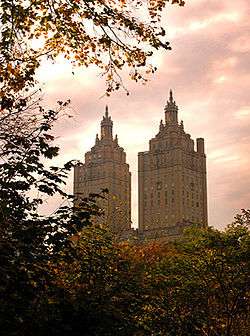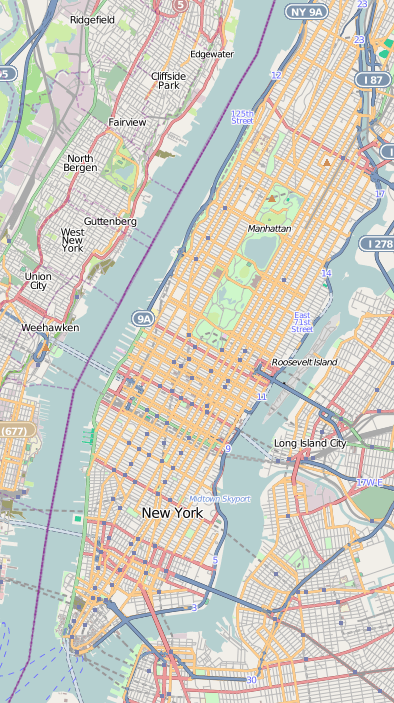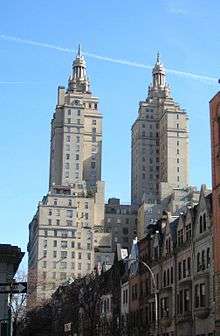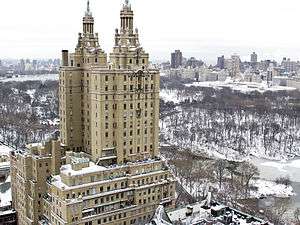The San Remo
The San Remo (145 Central Park West) is a luxury 27-floor co-operative apartment building in Manhattan located between West 74th Street and West 75th Street, one block north of The Dakota. Opened in 1930, the San Remo is described by Glen Justice of the New York Times as "a dazzling two-tower building with captivating views of Central Park."[1][3] As a housing cooperative, its board has a reputation for "lenient admissions standards" compared to the conservative, old-money boards on the other side of the park.[4]
The San Remo | |
 The San Remo | |
   | |
| Coordinates | 40.778036°N 73.974971°W |
|---|---|
| Built | 1930 [1] |
| Architect | Emery Roth |
| Part of | Central Park West Historic District (ID82001189[2]) |
| Added to NRHP | November 9, 1982[2] |
Apartments
When the San Remo was originally designed, it had a wide range of luxurious apartment configurations. The apartments were accessed from opulent twin lobbies which contained terrazzo floors, marble walls and custom light fixtures of bronze and frosted glass. The building has two addresses, 145 and 146 Central Park West, because the building was designed so that each half of the structure is served by separate lobbies, eliminating the need for long hallways across the main floor. There are still some doctor's offices on the first floor, but several of the professional/commercial spaces have recently been sold to tenants who reside in the building for use as office space.
Base
The average apartment contained eight rooms spread over about 3,000 sq ft (280 m2). Ten and eleven foot ceilings were the norm. As originally designed, the lower 14 floors were typically divided into seven apartments – two on each of the side street wings of the building and three laid out along the front of the building facing Central Park West. There are numerous setbacks built into the far ends of each wing of the building, allowing for terraces for several of the units. The original layout of the Park-facing units was unusual; most full-block buildings on the avenue divided the park frontage into four units, not three. This allowed the San Remo's apartments to have very generous frontage along the park in addition to typically spacious interior layouts.
The largest units on these lower levels are the "C-line" units, which occupy the southeast corner of each floor. The C-line apartments contain 620 sq ft (58 m2) living rooms, 300 sq ft (28 m2) libraries and 500 sq ft (46 m2) dining rooms all facing the park. C-line apartments typically had four bedrooms arranged along the 74th Street (south) side of the building. These units are approximately 4,500 sq ft (420 m2) in total.
Above the 14th floor, the building began a series of setbacks, which allowed for terraces for the various units from floors 14 through 17. These units were typically larger floor space, with larger rooms, than the units on the lower floors. The building has twin terrazzo and marble lobbies and terracotta embellishments.[1]
Towers

At the 18th floor, the building splits into the San Remo's iconic 10-floor towers, inspired by the drum of the Choragic Monument of Lysicrates The towers culminate in Renaissance-style Corinthian temples crowned by 22-foot-high copper lanterns.[1][5] The innovative twin tower design inspired imitators over the years, including The Majestic, The Century, The Eldorado and—most recently—the Time Warner Center.
In the north tower of the building there are two apartments per floor of approximately 2,500 sq ft (230 m2). These are typically two-bedroom units, with all of the public rooms facing the park.
The floors of the south tower are slightly larger, and these apartments as originally designed were all duplexed units. In total, these two-story units were approximately 5,800 sq ft (540 m2), rivaling the apartments in the best buildings of Fifth and Park Avenues (e.g., 834 Fifth Avenue), which typically range from 5,000 to 7,000 sq ft (460 to 650 m2).
The San Remo's south tower units have their public rooms on the lower level. The public rooms include 800 sq ft (74 m2) (36' x 22') living rooms, 290 sq ft (27 m2) (14' x 20.5') libraries, and 400 sq ft (37 m2) (17' x 24') dining rooms. There are also a breakfast room, kitchen, and several servants’ rooms on this level. A semi-circular staircase leads past windows facing the park to the second level. Upstairs are four bedrooms, including a master suite with a bedroom of 360 sq ft (33 m2), and a large dressing room and bathroom, for a total of over 500 sq ft (46 m2), and additional servants' rooms. A separate back staircase connects the rear portion of the apartments, linking the servants' areas.
Residents
Past and present residents of the building include such famous personalities as James Levine, Barry Manilow, Fred Ebb, Stephen Sondheim, Cesar Pelli, Diana Balmori, Tiger Woods, Steven Spielberg, Donna Karan, Tony Randall, Demi Moore, Glenn Close, Dustin Hoffman, Steve Martin, Bruce Willis, Eddie Cantor, Robert Stigwood, Jennifer Rush, Marshall Brickman, Jackie Leo, Don Hewitt, Dodi Fayed, Andrew Tobias, Aaron Spelling, Diane Keaton, Mary Tyler Moore, and Hedy Lamarr. Rita Hayworth spent her last years there, in a unit beside that of her daughter, Princess Yasmin Aga Khan. Steve Jobs bought and renovated a penthouse apartment but never lived in it, ultimately selling it to U2 singer Bono.
In 1985, Madonna applied to buy an apartment in the building but was infamously rejected by the residents board.[6] In 2007, Bono instigated a dispute with several neighbors, including Billy Squier, over damage from fireplace smoke. On December 23, 2013, philanthropist Robert Wilson committed suicide by jumping from his 16th floor apartment in the South Tower.[7]
History
Between 1890 and 1929, the current site of the San Remo, at West 75th Street, was occupied by an apartment hotel of the same name, which was demolished to make way for the present building.[8] The current building's architect, Emery Roth, took advantage of new zoning regulations to build the first of New York's twin towered apartment blocks.[9] Each of San Remo's ten-story towers is topped with an English Baroque mansion in the manner of John Vanbrugh and capped with a homage to the Choragic Monument of Lysicrates. The Athenian monument was known to Roth from the reproduction that had featured in the World's Columbian Exposition in Chicago, 1893. Roth also designed The Beresford and other landmark apartment houses and office blocks in New York. Construction began in 1929, weeks before the market crash initiated the Great Depression. The San Remo's construction process took approximately two years. In 1940 both buildings were sold for $25,000 over the existing mortgages.
The Great Depression
During the Great Depression, many of the larger units in the building were subdivided to make them easier to rent. All but one of the south tower two story apartments were divided into single floor units. Many of the larger C-line and E-line (northeast corner) units were also divided into smaller units. As a result, the total number of apartments in the building was expanded by approximately 20 units.
Conversion to a cooperative

The San Remo is now one of the most desirable and expensive apartment buildings in Manhattan. It converted to a co-op in the 1970s, meaning that tenants in the apartments are actually shareholders in the corporation that owns the building. Owning shares entitles one to reside in a particular unit. Purchasing apartments (shares) in the building is a significant investment.
Recent asking prices have ranged from a minimum of $3 million to a high of $75 million. The most desirable apartments (large units with Park views or tower floors) are typically valued at $2,500–$3,500 per square foot. The San Remo has consistently achieved the highest sale prices per unit on Central Park West, and is the top co-op building in terms of price per square foot on the Upper West Side, attaining prices of almost $5,400 per square foot for its penthouse units.
Many purchasers over the years have combined their units. Steven Spielberg combined two Park-facing units on the 16th floor into a 6,000 sq ft (560 m2) unit with terraces. A unit was reportedly sold to professional golfer Tiger Woods for $28 million in April 2008. Dustin Hoffman recently sold his unit.[10]
The 27th floor (top floor) of the north tower has been combined into a portion of the former mechanical space above it, creating a unique two-story unit. In total, the apartment has 3,500 sq ft (330 m2) of interior space and 1,300 sq ft (120 m2) of terraces. This unit was purchased by Bono from Steve Jobs for $15 million.[11]
Demi Moore owns the last remaining south tower two-story unit, at the very top of this tower. Moore and then-husband Bruce Willis purchased the apartment in 1987 from Robert Stigwood.[12] This unit was combined into a portion of the tower's mechanical and storage space above it (similar to the top floor unit in the north tower), creating a three-story unit with over 7,000 sq ft (650 m2) of interior space, multiple terraces and 360-degree views from all floors. As of May 2015, Moore was trying to sell the unit with an asking price of $75 million.[13] Demi Moore is reported to have finally sold her south tower penthouse apartment for $45 million in May 2017, a $30 million reduction from the original asking price.[14] This represents the highest price ever paid for a coop apartment on the Upper West Side in Manhattan.
Notes
- Finn, Robin (April 17, 2015). "Demi Moore Is Seeking $75 Million for Her Central Park West Penthouse". New York Times. Retrieved November 27, 2015.
- "National Register Information System". National Register of Historic Places. National Park Service. July 9, 2010.
- Glen Justice (June 23, 2004). "A Politician Looking for Funds? Here Are Two Useful Addresses". The New York Times. Archived from the original on March 9, 2014. Retrieved November 14, 2007.
- Gaines, Steven S. (2005). The Sky's the Limit: Passion and Property in Manhattan. Boston: Little, Brown. ISBN 0-316-60851-3.
- Nash, Eric Peter., and Norman McGrath. Manhattan Skyscrapers. New York: Princeton Architectural, 1999. Print.
- Ohrstrom, Lysandra. "Madonna Closes on Hard-Won $7 Million Central Park West Co-op". The Observer. Retrieved August 1, 2015.
- Stevens, Charles (December 26, 2013). "Robert W. Wilson leaps to death at 87; hedge-fund founder and philanthropist". Washington Post. Retrieved December 27, 2013.
- "New York City Landmarks Preservation Commission, UPPER WEST SIDE/CENTRAL PARK WEST HISTORIC DISTRICT DESIGNATION REPORT VOLUME I: ESSAYS/ARCHITECTS' APPENDIX," April 24, 1990, pp. 22, 52-53
- Brockmann, Jorg et al. (2002). One Thousand New York Buildings, pp. 344–345., p. 344, at Google Books
- David, Mark (February 13, 2014). "Dustin Hoffman Quietly Unloads San Remo Triplex". Retrieved May 3, 2018.
- Salkin, Allen (May 16, 2007). "Among the Rich and Famous, A New Dispute Over Air Rights". The New York Times. p. 1.
- http://www.cooperator.com/articles/1328/1/Celebrity-Appeal/Page1.html.
- Kell, Jennifer (May 7, 2014). "Demi Moore to sell $75 million San Remo triplex". The New York Post. p. 1.
- "Demi Moore's Central Park Penthouse Sells for $45 Million". May 5, 2017. Retrieved May 3, 2018 – via NYTimes.com.
References
- Brockmann, Jorg and Bill Harris. (2002). One Thousand New York Buildings. New York: Black Dog & Leventhal. ISBN 9781579122379; OCLC 48619292
- Ruttenbaum, Steven. (1986). Mansions In The Clouds: The Skyscraper Palazzi of Emery Roth. New York: Balsam Press. ISBN 9780917439094; OCLC 463245730
External links
- The San Remo
- San Remo:145 Central Park West Detailed building information, building ratings and area maps